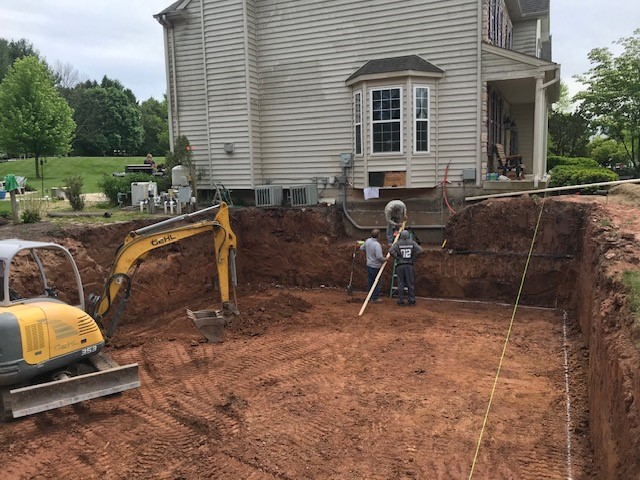Lancaster Trenching - Expert Trenching Solutions in Lancaster, Ohio
Lancaster Trenching - Expert Trenching Solutions in Lancaster, Ohio
Blog Article
Comprehensive Excavation Techniques: Understanding the Basics for Success
The mindful planning, exact execution, and thorough attention to information called for in excavation jobs require a detailed strategy that incorporates numerous basic aspects. The real proficiency exists not just in understanding these principles but in perfectly incorporating them to browse the complexities of excavation jobs with finesse.
Recognizing Excavation Job Planning

Effective excavation jobs are constructed on the foundation of extensive and precise planning. The initial stage of any kind of excavation job is the preparation stage, where vital choices are made that can significantly influence the end result of the project. Throughout this phase, it is important to collect all relevant details about the site, consisting of topographical studies, dirt make-up, and any type of prospective threats that might exist. Understanding the task budget plan, range, and timeline constraints is important for creating a comprehensive excavation plan that guarantees the job's success.
One key aspect of excavation task planning is the development of a detailed timeline that outlines the sequence of milestones, activities, and due dates. By meticulously considering all these aspects throughout the planning stage, excavation jobs can be carried out successfully and efficiently, leading to successful outcomes - excavating ohio.
Soil Evaluation and Website Examination
Performing detailed dirt analysis and site analysis is an important action in the preparation phase of any kind of excavation task. Soil analysis involves establishing the make-up, structure, and properties of the soil at the excavation site. This information is vital for comprehending the soil's bearing capacity, dampness material, and capacity for disintegration, which are vital consider identifying the excavation methods and devices required for the job.
Website examination goes past soil analysis and encompasses a wider assessment of the general website conditions. This analysis includes identifying any kind of potential threats, such as below ground energies, ecological problems, or unpredictable surface, that might impact the excavation process. By extensively reviewing the site, task managers can create efficient excavation strategies that focus on security, efficiency, and environmental security.
Making use of sophisticated innovations like ground-penetrating radar, dirt sampling, and drone surveys can boost the precision and effectiveness of soil evaluation and site evaluation. Investing time and sources in these initial actions can eventually save time and avoid pricey hold-ups or complications throughout the excavation procedure.
Equipment Choice and Utilization
Efficient excavation jobs rely heavily on calculated devices choice and application to ensure ideal performance and efficiency. Picking the appropriate tools for the task is essential in taking full advantage of effectiveness and reducing downtime. Aspects such as the kind of dirt, deepness of excavation, and job extent play a substantial duty in identifying the most appropriate devices for the task handy.

Along with choosing the proper devices, proper use is vital to task success. Operators must be trained to deal with the equipment safely and effectively - dump truck companies in ohio. Normal upkeep checks and timely repair work help prevent break downs and make certain consistent performance throughout the project
Safety Measures and Rules Conformity
In the realm of excavation jobs, focusing on precaution and conformity with regulations is paramount to making certain a legitimately audio and safe and secure operational setting. Security actions include a series of practices, consisting of performing comprehensive site evaluations, applying appropriate signage and barriers, and offering appropriate safety and security training for all workers entailed in the excavation process. Adherence to regulations, such as OSHA demands in the United States, ensures that the excavation task satisfies the essential requirements to secure workers, spectators, and the surrounding setting.

Monitoring Progression and Adjusting Approaches
Just how can forecast managers successfully track the development of excavation tasks and adapt their techniques accordingly to maximize end results? Tracking development is essential for making certain that excavation jobs remain get redirected here on track and fulfill target dates. Job managers can use different tools and methods to track development, such as day-to-day report card, regular website evaluations, and progressed surveillance modern technologies like drones and GPS tracking systems. By continually monitoring the project's improvement, managers can determine any type of prospective delays or problems at an early stage and take positive steps to address them.

Final Thought
To conclude, mastering the basics of comprehensive excavation methods is vital for the success of any kind of project. By understanding project preparation, examining dirt and website conditions, selecting appropriate tools, conforming with safety laws, and keeping track of progression, project supervisors can guarantee a smooth and effective excavation process. Implementing these strategies will lead to successful end results and lessen potential risks or troubles during the excavation project.
The additional reading first stage of any type of excavation job is the preparation phase, where crucial decisions are made that can substantially influence the end result of the task. Recognizing the job scope, budget, and timeline image source restrictions is essential for producing a comprehensive excavation strategy that guarantees the project's success.
Just how can predict managers efficiently track the development of excavation tasks and adapt their techniques as necessary to maximize results? By carefully keeping track of progression and being eager to adapt strategies, job managers can boost the total success of excavation tasks.
By understanding project preparation, assessing dirt and site problems, choosing proper devices, abiding with security policies, and keeping track of progress, project managers can guarantee a effective and smooth excavation process.
Report this page